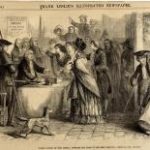United States senators have been elected directly by voters since 1913. Prior to that time, state legislatures chose the state’s senators. In the mid-1850s, however, the state legislature selection process began to fail due to political infighting and corruption. Often Senate seats were left vacant for long periods of time while state legislatures debated who to send to the Senate.
How the Law Regulates Who Votes

In this lesson, students will discuss what qualifications are necessary to vote. The activity presents a series of potential voters for a student council election, and asks that students either allow or prohibit each person from voting. After reflecting on their justifications, they will learn that states and the federal government have very few restrictions on voting. The instructor might then lead a discussion on the importance of voting to the democratic process
Rucho v. Common Cause (2019)
This case explores the following issues: Do Common Cause and the League of Women Voters of North Carolina (the plaintiffs) have constitutional standing to make these partisan gerrymandering challenges? Are the plaintiffs’ partisan gerrymandering claims able to be heard by the Court? If plaintiffs have standing and their claims are justiciable, is North Carolina’s 2016 congressional map an unconstitutional partisan gerrymander?
Evaluating Election Ads
Women Vote in New Jersey (1776-1807)

This short video focuses on late 18th century New Jersey—the only state which (temporarily) enfranchised (some) women. The 1776 New Jersey constitution granted voting rights to all property-owning inhabitants while the constitutions of 1790 and 1796 referred to voters as “he and she.” Professor Rosemarie Zagarri concludes that the political ideology of the American Revolution did have lasting implications for women, even though New Jersey rescinded their voting rights in 1807.
Is the System Fair?

Throughout U.S. history, Americans have silently stewed and actively protested that presidential elections are unfair and fixed against them. Do they have a point? In this lesson, students will understand why people are critical of the political process. They will discuss the topic: Do all voters have an equal voice in American democracy? Registration at NewseumED is required to view this resource.
Staging Spectacles to Win Votes
Running for president is a lot like putting on a show. As candidates tour across the country, they stage carefully choreographed events in hopes of impressing voters.
Primaries: By Invitation Only?
Primary season can be a wild ride. Voters narrow the field of candidates in contest after contest, while the parties use complicated rules to try to control who ultimately secures the nomination.
Frenzy of the Final Weeks
In the last weeks of the campaign, candidates make a final push to sway undecided voters and strive to avoid even minor mistakes that could magnify into embarrassing gaffes.
Crawford v. Marion Co. Board of Elections (2008)
Does Indiana’s statute requiring voters to present a government-issued photo ID severely burden citizens’ right to vote? This case summary shows how the Supreme Court answered that question in 2008.
